The nom de plume “Yggdrasil” refers to the World Tree of ancient Norse mythology, whose roots were in Hel, whose branches reached to Asgard, and whose trunk contained Middle Earth. Yggdrasil was the axle on which the cosmos turned.
Below is an excerpt from some of Yggdrasil’s writings. It was translated into English by the author in collaboration with Phanarath.

Freedom of Speech, the Rule of Law, and Democracy
by Yggdrasil
The Western world is threatened. In some places hard-won principles are no longer functioning
And that will not do: freedom of speech, the rule of law and democracy must be preserved
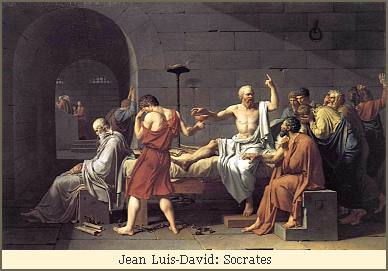
Freedom of speech
The most important human right is freedom of speech. From freedom of speech flow all the other freedoms.
And where does the idea of freedom of speech come from? In the philosophical system it comes from a very specific place. Consider this:
My dear fellow citizens, in spite of all possible esteem and respect for you, I will continue to follow God’s command and not yours, and as long as I can breathe and am capable, I will not stop my search for truth; I will continue to reprimand and instruct you, and when I meet one of you, I will speak to him in my usual way, maybe like this: Listen dear friend, you are from Athens, which has the reputation of being highest in power and culture. Don’t you think it’s degrading that you only care about money and reputation and honor, and only think about how your fortune can become as large as possible, but don’t care the slightest bit about justice and truth, and never think about how your soul can be as good as possible?
The above quote is from the judicial process the tyrants initiated to stop Socrates — who, as is well known, chose to die rather then keep quiet. They used all kinds of dirty tricks, slander, and accusations against him.
Socrates was the first philosopher and founder of all ancient Greek culture, and with that the founder of democracy, the rule of law, and science. Socrates represents the spirit of freedom of speech, the belief that there is more to gain by searching for truth and justice via debate than there is in old books.
This idea is under threat today.
The rule of law
Socrates’ project has come a long way since he drank his cup of hemlock. One of the results has been the rule of law; you can hear the resonance of his ideas in Jyske lov [the law of Jutland], the first constitution of Denmark. Consider this:
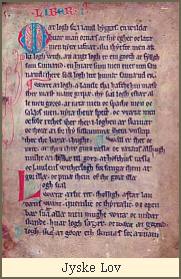 “If there was no law in the land, then he had most who could get the most. Therefore the law is made for everyone’s benefit, so that the just and peaceful and innocent can enjoy their peace, and the unjust and evil can live in fear of that which is written in the law, and therefore will not dare to act out the evil deeds they have in mind.”
“If there was no law in the land, then he had most who could get the most. Therefore the law is made for everyone’s benefit, so that the just and peaceful and innocent can enjoy their peace, and the unjust and evil can live in fear of that which is written in the law, and therefore will not dare to act out the evil deeds they have in mind.” And:
“The law must be honest and just, durable, by the custom of the country fitting and useful and clear, so that everyone can know and understand what the law says. The law will not be made or written to any man’s special advantage, but to the benefit of all who live in the country.”
The law of Jutland was inspired by Roman law, which was inspired by Greek culture and science — one can draw a straight line from the law we have today back to the ideas and spirit of Socrates. I also think we can hear it; it’s the same tone.
- - - - - - - - - -
In a lawless state the citizens are victims of randomness and tyranny. Dictators can create their own little dictatorships, and dominate everyone around them. Tyranny, oppression, and the random use of power are the agenda of the day. The rule of law protects citizens from tyranny, in that the law is above the tyrant.
In the philosophy of law the nature of law is discussed. As a moral philosopher I believe that courts can bring justice. Justice is the prime value that contains other values; justice can be honesty, tolerance, respect, and openness. This is the ideal Socrates believes in, and with him so do I.
Today the rule of law is a thousand-year-old system, and has developed many good principles — the burden of proof, conviction by the testimony of witnesses, and much more — but the essence of rule of law is that it brings justice.
Democracy
Socrates lived in a democracy. Socrates was Athenian, and Athens’ mark of nobility was the democracy. To me his example represents the inner life of democracy.
Socrates believed that man can find truth, and the way to a good world is through dialogue. It is naïve to think that justice can only be discovered in old books, since the world is constantly changing. It is much more sensible to find solutions in a reasonable discussion of the reality we find ourselves in. The goal must of course always be “the good”, meaning a better society where people are joyful and happy.
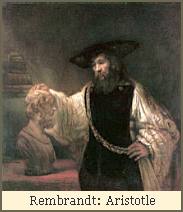 Aristotle, another Athenian, believed that freedom is the essence of democracy — democracy is conceived, along with the rule of law, as a guard against random use of power and tyranny. The citizens can choose to change their rulers if they become corrupt. Politicians are the servants of society.
Aristotle, another Athenian, believed that freedom is the essence of democracy — democracy is conceived, along with the rule of law, as a guard against random use of power and tyranny. The citizens can choose to change their rulers if they become corrupt. Politicians are the servants of society.Today the project of Socrates is threatened. There are places in the West where his project in has in fact been abandoned. That is unacceptable, and it is the duty of our political leaders to make sure that all the people in the entire West can enjoy the rule of law and the protection of democracy.
There are places where a kind of Muslim law, called sharia, sets the agenda. And this law is not the same as Roman law. In practice the areas of sharia develop into small dictatorships, and people who are not in favor of sharia are being intimidated.
Democracy and the rule of law are beneficial for all citizens — Muslims, atheists and Christians — and without it we can not live together in a peaceful and reasonable way. If groups within the population refuse to take part, the whole of society is threatened.
That will not do — our society will dissolve.

A Brief Autobiography of Yggdrasil
Every 200 to 300 years Western civilization goes from decay to rebirth. A civilization riddled with stupidity, arrogance, and corruption turns on its heel, brushes off its feathers, and rises from the ashes. As the phoenix, the West shines once again, bringing reason, science and freedom to shores far away.
I believe the eternal developmental wheel of western civilization is at such a point right now - we have all been corrupted with ideas of no intrinsic value, and our societies are crumbling under the burden of megalomaniacal welfare states or bureaucratic socialist rule. It is time to find our roots once again.
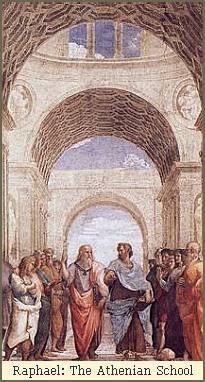 It is an act we have seen numerous times; Thomas Aquinas and the Catholic renaissance, Leonardo Da Vinci and Michelangelo in the Italian renaissance, Rembrandt and Descartes in the Dutch renaissance, and most recently Rousseau, Montesquieu, and Napoleon in the French renaissance.
It is an act we have seen numerous times; Thomas Aquinas and the Catholic renaissance, Leonardo Da Vinci and Michelangelo in the Italian renaissance, Rembrandt and Descartes in the Dutch renaissance, and most recently Rousseau, Montesquieu, and Napoleon in the French renaissance.And it all comes back the rebirth of ancient Athens: Socrates, Aristotle, Plato. Politics, art, science and philosophy are reinvented — reason descends upon us once again.
And here I enter; the philosopher Yggdrasil — somehow caught in these world-changing events.
Where do I come from? I come from an ancient family of philosophers. My great-great grandfather was a philosopher of some renown, and it has been a tradition in my family to defend Western civilization, and especially democracy. The torch of philosophy has been handed down through the generations from farther or mother to son or daughter. We have lived lives of obscurity for the last thirty or forty years — socialism has been all the rage in Denmark, and there has been no use for us. But now things seem to have changed, all of a sudden people show interest in our ideas again.
What is the main focus of a modern philosopher?
There is one central battle that we have to win, and that is the fight for freedom. Not only freedom in an abstract sense, within the economy or the bureaucracy of the state — but in an unyielding support of freedom of speech, the essence of democracy and science. This is the first and most important barricade of a western state. As soon as we are overwhelmed by the glossocrats, the politically correct, or the Islamists, we are finished — democracy and science will not function any longer.
Secondly, and combined with the fight for freedom of speech, we fight for our physical freedom, the right to remain free from slavery in our own countries. The Islamists have a long tradition of slavery in their culture. It has even been institutionalized, in the organizations such as the Ottoman Janissaries. This is a very real danger, already in effect in many ghettos around Europe. It will continue its development if we do not stop it.
Thirdly, we fight for Roman Law, an ancient Western institution, inspired by the Athenians but with roots going as deep as the pharaohs of Egypt. It includes a faith in justice, given to us by judges, persons with rationality as their prime tool.
The rule of law has so far freed us from the rule of the strongest, the rule of the mob. This institution is threatened by the Islamic legal institution known as Sharia. If we do not defend Roman Law, it will cease to function wherever Islamists are in charge. It is already out of effect in numerous ghettoes around the world, in Denmark, Sweden, Norway, Holland, England, France, Germany, Belgium and so on. Roman Law has been swapped for Sharia , a system of law based on the Koran. This will not do.
So what brought a philosopher to the Gates of Vienna?
Well, actually it has been quite a journey, through many a landscape, with choices hard to make.
It all started with the Mohammed Cartoon Crisis — as with many other people around the world, a drama of surrealistic proportions and implications unfolded right in front of my eyes. It seemed weird, and the daily life of most Danes just kept on as it used to. I tried to defend my country the best I could, but at that time I was even more unknown than I am now. So it all came down to a few articles on central Danish blogs. It made me think, however, and I started checking things out on the internet — implications started to dawn upon me, and I realized that this danger of Islamism was for real. Many other things dawned upon me as well: the socialist control of the MSM, academia and government. You all know the drill.
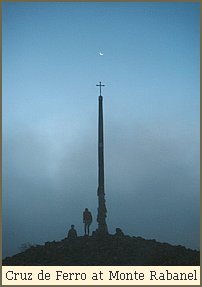 I felt an obligation to do something, I am a philosopher — and freedom of speech was at stake, but I couldn’t really decide what to do. I the summer of 2006 I went on a pilgrimage to Santiago de Compostella — the Camino. For three weeks I walked through dense forests, over plains — I climbed mountains and saw eagles soaring over the beautiful plains of Galicia . When you are on a pilgrimage, you are alone with your own thoughts. And my thoughts kept coming back to the issue of Mohammed and his depiction in Jyllands Posten. I had brought a book of Aristotle with me, the “Politics”; I read through it, and discussed it with myself. And at a certain point, I do not really remember when, I decided to join the Counterjihad when I returned home.
I felt an obligation to do something, I am a philosopher — and freedom of speech was at stake, but I couldn’t really decide what to do. I the summer of 2006 I went on a pilgrimage to Santiago de Compostella — the Camino. For three weeks I walked through dense forests, over plains — I climbed mountains and saw eagles soaring over the beautiful plains of Galicia . When you are on a pilgrimage, you are alone with your own thoughts. And my thoughts kept coming back to the issue of Mohammed and his depiction in Jyllands Posten. I had brought a book of Aristotle with me, the “Politics”; I read through it, and discussed it with myself. And at a certain point, I do not really remember when, I decided to join the Counterjihad when I returned home.Dangerous work, but my duty as a Danish philosopher.
Now the good Baron Bodissey has invited me to write here at the Gates of Vienna, a great honor I will try to repay the best I can. Baron once asked me; how would you want to fight Islamism? And I answered him: Through inspiration. This is my task, as I see it — I will try to inspire you; to explain, in simple words, the beauty of Western culture, the elegance of its ideas. To give you all my enthusiasm for Socrates and Aristotle, to renew what was taken away from us by naïve socialists.

11 comments:
Yggdrasil,
Wonderfully written post here. I hope to see more from you.
Sorry if this next bit seems nonsensical, but I can't find a better way to phrase this. Having met many philosophy majors, dealing with their arrogance (a regurgitation of airy post-modernish relativist BS.) by condescendingly retorting "every man a Socrates", it is nice to read somebody who appears worthy of the title "philosopher"
Bets of luck to you. Take care.
npabga
That's not nonsensical at all. Its an excellent way to put it. I have been trying, without much success, to explain what I thought of these writings and you just nailed it. In the future ill simply refer to your post and save myself the stuttering :-)
I'm not sure I follow you on this one. Sew Crates, (as his name was pronounced in “Back to the Future”) was no democrat, was absolutely not a liberal (in the proper sense of the word) and was epistemologically opposed to all science. Socrates envisioned a society governed by philosopher kings, who would presumably be self appointed. In the modern world, it would be as if the faculty of Harvard ruled the US absolutely through a Council of Wise Persons. His concepts of a body of guardians most closely resembles the government of modern day Iran. He exhibited a distrust of poets, politicians and lawyers, which might make sense at first glance, but usually only leads to suppression. His epistemology of idealism finds its highest expression in mathematics, but tends to be the enemy of chemistry, biology, medicine, astronomy and geology. If the world had followed Socrates' path, we would still be looking for ideal forms and not the microbial theory of disease, elements on the periodic table, micro-circuitry or nano technology.
The modern descendants of Socrates are Kant, Marx, and Hegel. If you want to find the ancestor of Locke, Mill or Jefferson, look at Aristotle.
You said
“Socrates was the first philosopher and founder of all ancient Greek culture, and with that the founder of democracy, the rule of law, and science. Socrates represents the spirit of freedom of speech, the belief that there is more to gain by searching for truth and justice via debate than there is in old books.”
I doubt Socrates was the founder of Greek culture. I think that was a societal evolution that took place centuries before he was born. As I said above, he was no democrat. He died because he defied the law under which he was ruled. Had he become the world’s philosopher king, science may never have happened. Free speech? Had he his way, the poets and sophists, as he defined them, would have been rounded up and put away.
To George Bruce:
Well in a way you are both right and wrong. The basic problem about defining the thoughts of Socrates is the fact that he did not write anything himself - it was primarialy conveyed through Plato.
The thing is just that Plato puts a lot of his own thoughts in his writings, and the older he got, the more of himself was in the writing.
There is however one exeption, and that is the defencespeech of Socrates. That speech is almost surely the words of Socrates - it is written as one the first things Plato wrote, and it definately has a different energy than the late elegant work of Plato.
In the defensespeech you get Socrates for real.
It is rigth however that Plato in his work "the republic" defines a state very close to the spartan citystate - and he puts the ideas in the mouth of Socrates.
There is however no doubt in the fact that Socrates supported democracy - he fought two battles for the democratic Athens. Putting his own life at the risk of his town. So he must have believed in it. That is one point. The other point is, that he was the mentor, and actually the lover of Alcibiades - the heir to Pericles - the prime ruler of democratic Athens.
So to understand the ideas and the depht of Socrates, you have to combine different sources, not just read Plato.
And when you read Aristotle he refers to Platos Socrates in citation marks, writing: 'Socrates' says. In this way critizising the way Plato uses Socrates. I totally agree with Aristotle, i think Plato was a jerk in his political writings. A lot of the other philosophical work Plato did was very cool, and very beautiful - but trying to make a idealize a Spartan state was not right, and it has had dire consequenses for western civilization through the last 2400 years. Just take communism, a clumsy application of Platos Spartan state.
Democracy was not something Socrates invented, it was the ruling form of Athens, firstly defined by Solon, and then ultimately defined by Socrates.
The thing about Socrates is, that when you actually start to understand the idea of his philosophy it very much amazes you - it is so simple and yet so comlicated that it takes your breath away.
This will be the focus of a future post.
Trackbacked by The Thunder Run - Web Reconnaissance for 06/06/2007
A short recon of what’s out there that might draw your attention.
Phanarath,
Feel free to use, build upon, or critique anything I write. I am standing on the shoulders of giants after all and can't say that anything I've ever written is the product of my own mind anyways.
Take care, and I've enjoyed many of your earlier posts.
It has been distilled to:
The 1st Amendment in the mouth.
And the 2nd Amendment is the teeth.
Freedom of speech doesn't defend itself without recourse to the right to disagree -with force of arms. (The always-latent "militia".)
But prefers to argue it out.
"...Amendment is the mouth..."
(No grammar check yet.)
"Socrates was the first philosopher and founder of all ancient Greek culture, and with that the founder of democracy, the rule of law, and science."
O great Yggdrasil, I humbly bow to your infinite wisdom, for you truly are a philosopher: only a philosopher could manifest such ignorance of plain historical facts as you do in the above quoted sentence (which is only one example of many similar gems of yours).
The first philosopher was Thales, who thought that everything was water. Everyone who has read Bertrand Russell's "History of Western Philosophy" ought to know that. And Greek culture was born centuries before Socrates. But anyway, Nietzsche thought Socrates as the END of Greek culture, not any kind of beginning; he saw Socrates as a decadent, his quest for the "truth" as a betrayal of Greek virtu and vitality. I agree with Nietzsche.
At present, what the West needs is simply what the muslims still possess, but we have lost: will to power. Yes, socialism is to blame. But clinging onto concepts such as "truth", "freedom", "rule of law" or "democracy" is merely another kind of socialism in a time that demands ruthless action. The West does not need philosophers right now (sorry), it needs a Caesar. Or maybe a Western prophet who will announce our own jihad, a new crusade.
Dear Lauri :-)
Bowing to my immense wisdom is very nice of you - hereby appreciated.
You are right, the formulation was a bit unprecise, and Socrates was not the first philosopher. Actually the basic idea of truth as a way to understand everything is much more clearly formulated in the Egyptian faith in the God Ra - than by the greek philosophers.
But Socrates was seen as the starting point of all serious philosophy. The Miletian philosophers Thales, Animaxander and Anaximenes tried to understand life as in water, air and earth - ideas rejected not very long after. It was mostly a prelude to Socrates.
I suppose you are then in agreement with Nietzsche that Heraclitus was the only philospoher of any value. I like Heraclitus, and if there was one philosopher that could challenge Socrates as the first serious philosopher, it would be him.
It is however quite clear, that most philosophers (except for Nietzsche) see Socrates as the founder of philosophy.
My only comment to the philosphy of Nietzsche in general is that the arguments he has against Socrates are not really of any value. It is mostly arguments like: Socrates was so stupid looking, that you cannot take him serious. Well that is just not good enough. You cannot just value a philospher on his looks - that is just ridicoulous.
Maybe you know an argument that Nietzsche put forward against Socrates that i did not encounter. Then let me know.
And then a comment on the need for a new western Caesar.
Well, as anybody else fighting, the Caesars they need something to fight for. And the above mentioned is what we are fighting for, because it constitutes the basis of the western civilization.
The philosophy of Nietzsche found its ultimate expression in Nazism. Nazism was not totally defined by Nietzsche - after all it was National Socialism, and the racial theory af nazism came from social Darwinism. But the feel, and the boundless german fight for Lebensraum was very much Nietzsche. And the result of that was bad.
The difference between danish and german nationalism - although being very close in its focus on the viking tradition, is that Grundtvig defined a positive nationalism. A nationalism focused on joy and happiness, rooted in the traditions of hellenism and christianity.
We Grundtivigians are not näiv, we fight for our country, but it is not to be imperialistic - but to defend ourselves.
It is, in our opinion, much more important to focus on the inside than the outside. Instead of ruling this or that country, it is much more wise to use the enegy to build the culture of your own country. Giving philosophy and education to all members of society.
This is a practical philosophy created according to the realities of the danish nation. We could not do anything else, because we are only 5 million people. Too few to rule any other country - but it has served us well so far.
Post a Comment